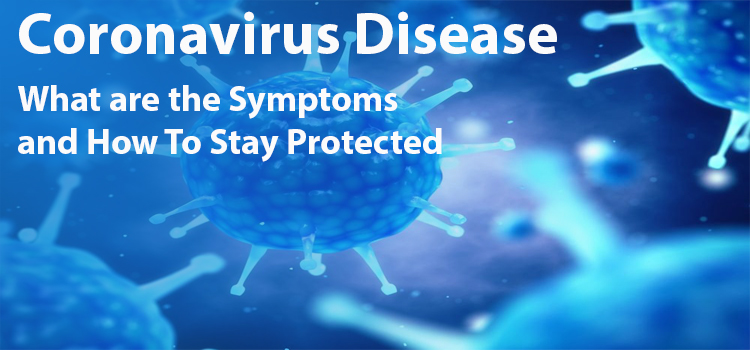COVID-19 or Coronaviruses is a pandemic believed to be transferred to humans from animals. If you are not careful enough, you are most likely to catch it. The outbreak has caused chaos worldwide. The disease causes a respiratory illness with symptoms such as fever, cough, and difficulty breathing.
What Are Coronaviruses Symptoms?
WHO says the most common symptoms for this disease are fever, tiredness, and dry cough. If you are sneezing that doesn’t necessarily mean you have caught the virus. Some patients, however, have shown symptoms such as a runny nose, nasal congestion, sore throat, pains, aches and/or diarrhea. 80 percent of the people getting COVID-19 experience mild cold-like symptoms and they recover without needing any special treatment.
If a majority of the patients have recovered, Who are the ones to become seriously ill? That category includes elderly or individuals with underlying medical issues such as heart problems, blood pressure, diabetes, and chronic respiratory conditions.
Other coronavirus symptoms include:
- High temperature (hot to touch on back or chest)
- Continuous cough
- Muscle ache and tiredness
- Headache
This virus is similar to pneumonia, antibiotics are not effective against it. Antiviral drugs against flu don’t work either. The recovery depends on the individual’s immune system.
How Many Coronaviruses Patients Are Out There?
According to WorldOMeter, 392,169 people have been affected by the virus throughout the world. The number of deaths is 17,138 and the number of people recovered is 102,850.
The virus has affected 196 countries around the world. After China and Italy, the countries with the most infected cases include the USA, Spain, Germany, Iran, France, Switzerland, South Korea, UK the list goes on.
How to Protect Yourself from COVID-19?
To protect yourself from the virus, practice simple precautions such as:
Practice Social Distancing
To slow the spread of the virus, social distance is very critical. This minimizes the contact between potential infected and healthy individuals.
- Maintain a safe distance of at least 2 meters or 6.5 feet between you and the other person
- Reduce social interaction with people outside home or workplace
- Avoid going to crowded places
- Work from home
- Do not shake hands or make close contact with others
Wash Your Hands Frequently
Wash your hands thoroughly and frequently for at least 20 seconds. Make sure you wash your hands in the following scenarios:
- After coughing/sneezing
- Before and after preparing food or eating
- Washing your hands with soap or alcohol-based sanitizer to kill the virus
- Before and faster using public transport
- Arriving and leaving home or building
Don’t Touch Your Face, Eyes, Nose or Mouth
One major source of picking up Coronaviruses is your hands. Contaminated hands transfer the virus to eyes, nose, and mouth. The virus can then enter your body, making you sick. Hence, even if you have clean hands, avoid touching your face.
Practice Respiratory Hygiene
You and the people around you must practice good respiratory hygiene too. That means covering your mouth or nose with a tissue when you cough or sneeze. If a tissue is not available, you can also cover it with a bent elbow. Make sure you dispose of the tissue after the use.
Are Gloves And Face Masks Mandatory?
Some people have been wearing disposable gloves to keep their hands protected. It is not an effective trick to keep your hands protected from the virus. Experts say the virus can get on the gloves in the same way they get on your hands. Gloves can rip and they are not as effective for daily use.
If you are not sick, there is no real benefit of wearing a mask. Apart from those infected, healthcare workers need a mask to protect themselves from the infection while treating the patients.
Do Coronaviruses Affect Children?
We do not know as yet about if or how the virus affects children or pregnant women. A person of any age can be infected by the virus. When it comes to how many coronaviruses cases are children, the number is very limited.
It’s important to remember the virus is fatal in rare cases. Older people who have passed away had underlying health conditions. If your kids show symptoms such as flu or cough, seek medical assistance immediately. However, do remember it is flu season in most regions.
Continue to encourage your kids to follow good hygiene practices. Avoid taking kids to public places during the time of the outbreak.
What To Do If You Are Will With The Virus?
If you are ill with the virus, wash your hands frequently, avoid sharing your personal items with others and cover when you cough. Those who are exposed to the virus or have been diagnosed must follow these guidelines:
- Stay home or in an isolated location
- Keep a separate room from your family and pets
- Wear a mask when you are around other people
- Don’t share same cutlery
- Use separate bathroom
In case you are extremely ill, you may need to be treated in a medical facility. Those who have mouth cancer or any other type of cancer and get infected by the virus must seek medical help immediately.
When To Self-Isolate?
Anyone who experiences cough or fever is recommended to isolate themselves for 7 days from the day the symptoms begin. Others in the house must isolate themselves for 14 days as well.
After the isolation period, your fever will go away and you will feel better. You may end isolation after 7 days. Chances are your cough persists.
Self-isolation means you must:
- Stay at home
- Do not use public transport such as taxi, buses or trains
- Ask a friend or family to run errands on your behalf. If no one is available, use delivery services
- Ask the delivery company to leave your delivery outside the door
- If there are kids or pets in the house, isolate them as well
- Isolate yourself from others and don’t sure towel, cutlery, crockery, and bedding
Final Words
Keep posted with the WHO updated on the virus. Stay home and keep yourself and your loved protected.
Do not believe everything people say about the virus. We are surrounded by several myths already. Stay in touch with credible health sources for the latest information on this pandemic. Stay safe, stay indoors!




